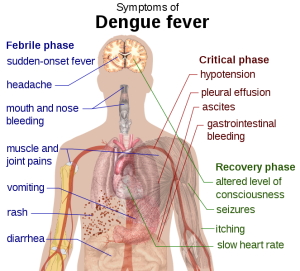While Dengue Fever isn’t common in the cities in Thailand, if you spend time jungle trekking or backpacking to out of the way places, or even swimming in mosquito-infested waters, there is a possibility you can contract it.
Dengue fever, if not treated properly, can be fatal, so be sure you know how to tell if you’ve picked up dengue fever in Thailand and what to do about it if you have.
Symptoms of Dengue Fever – The symptoms of dengue fever can come on quite quickly. It often begins with a high fever, a blinding headache, odd rashes, weird joint pains and muscle aches, and the need to throw up. Symptoms will usually develop between four days and a week after being bitten by an infected mosquito.
Of course, there’s a specific mosquito that carries the dengue fever virus, but it’s not much point describing it. After all, it’s about the size of a pin head and it will have bitten you before you even see it.
What to Do About Dengue Fever in an Initial Infection – With an initial infection of dengue fever, there’s not much a Thai doctor can do for you that you can’t do at your hotel or apartment yourself.
Stay indoors with the air conditioning on, get lots of sleep, drink plenty of water and eat fruit, vegetables, brown rice and other nutritious foods. You can bring down the fever with Paracetamol, but don’t use Aspirin as it can cause bleeding, which is the last thing you want. (see What to Watch For After You Feel Better as to why).
You’ll likely be two weeks to a month before you start to feel ‘normal’ again, so don’t overdo it, even when you do begin to feel better.
What to Watch For After You Start to Feel Better – One thing you need to be very aware of if you catch dengue fever in Thailand is the possibility of it developing to something even more serious.
DMF or Dengue Hemorrhagic Fever sometimes occurs after the person infected has already begun to feel much better. Symptoms of this include throwing up, black feces, and nose, gum and intestinal tract bleeding. If it’s not treated, you can die.
If severe symptoms such as these develop, get to a doctor or the emergency room of a Thai hospital immediately. Most are well-trained in dealing with it.
Luckily for you though, the people who get DMF are adults with compromised immune symptoms (those with HIV, cancer etc,), young children or the elderly — so, if you do not fall into any of these groups you have only a small chance of contracting it.
Prevention – The best way to prevent getting dengue fever is to stay away from mosquito-infested waters, eat inside restaurants at night, wear a mosquito repellent spray at all times and don’t sleep outside or in hotel rooms or beach bungalows that have open gaps where a window should be.




